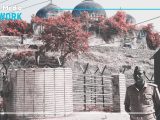
65,000 Cancer Cases Registered in IIOJK in Last 5 Years
April 2, 2025Jammu, April 1 – Indian illegally occupied Jammu and Kashmir (IIOJK) is witnessing an alarming surge in cancer cases, with over 13,000 new cases reported annually. According to official data, more than 65,000 cases have been recorded in the last five years, raising concerns about the deteriorating public health crisis in the conflict-ridden region.
In a written reply to the Rajya Sabha, India’s upper house of parliament, Minister of State for Health and Family Welfare Pratap Rao Jadhav revealed that as per the Indian Council of Medical Research (ICMR)-National Cancer Registry Programme (NCRP), 14,112 new cancer cases were recorded in IIOJK in 2024 alone. The figures for previous years paint a similarly grim picture—13,724 cases in 2023 and 13,395 in 2022—highlighting a steady increase in the disease’s prevalence.
Military Occupation and Rising Cancer Rates
Health experts and human rights activists argue that the prolonged military occupation of Jammu and Kashmir has exacerbated environmental contamination, making the region a hotspot for various chronic illnesses, including cancer. The presence of over 900,000 Indian troops, coupled with the extensive use of tear gas, explosives, and shelling, has significantly polluted the air, water, and soil, increasing carcinogenic exposure among the local population.
Reports suggest that military waste, unexploded ordnance, and chemical agents have contributed to the region’s growing health crisis. The excessive use of toxic tear gas and other crowd-control weapons has not only led to immediate respiratory issues but has also introduced harmful chemicals into the environment, raising long-term cancer risks.
Psychological Stress and Immunosuppression
Beyond environmental hazards, the ongoing conflict has inflicted deep psychological wounds on the Kashmiri people. Decades of enforced disappearances, torture, and a constant atmosphere of fear and surveillance have taken a toll on the mental and physical health of civilians. Medical research suggests that chronic stress weakens the immune system, making individuals more susceptible to life-threatening diseases, including cancer. The continuous psychological trauma experienced by Kashmiris has, in turn, contributed to their declining health resilience.
The Urgent Need for Intervention
The rising cancer epidemic in IIOJK demands immediate international attention. The worsening health crisis, compounded by India’s militarized policies, highlights the urgent need for independent health interventions and environmental studies in the region. Human rights organizations have called for an investigation into the long-term impact of military activity on Kashmir’s ecosystem and public health.
As the crisis escalates, the people of Jammu and Kashmir continue to suffer in silence, trapped between the devastation of war and a worsening health catastrophe. The international community must step forward to hold India accountable for the environmental and humanitarian consequences of its occupation while ensuring that adequate medical resources and preventive measures reach the affected population.

